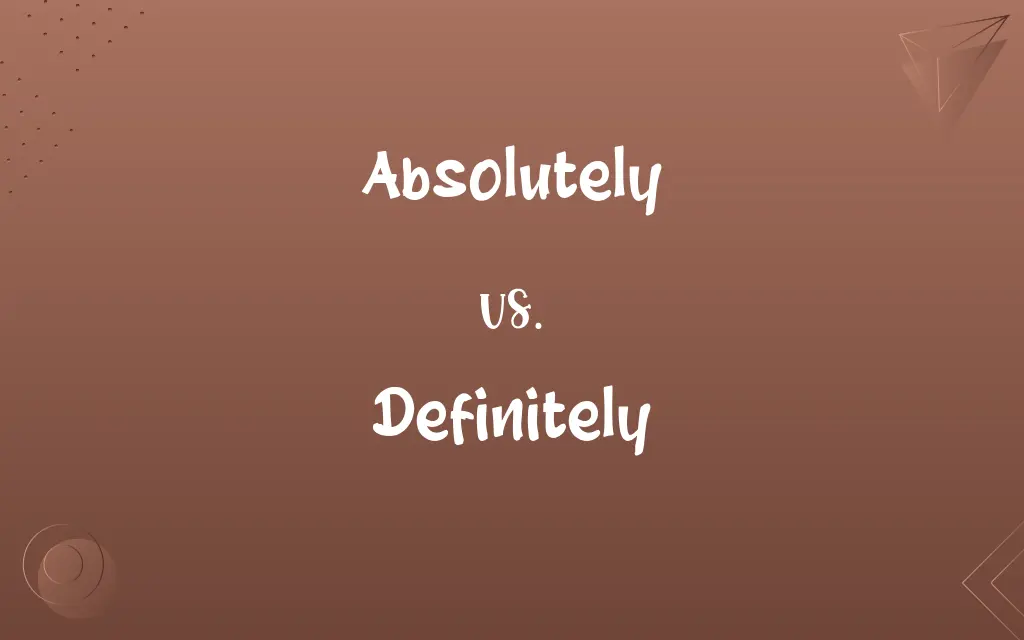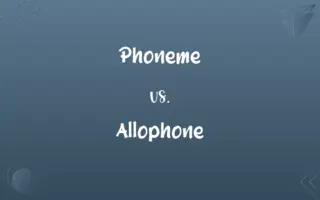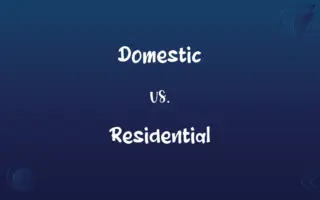Absolutely vs. Definitely: Know the Difference

By Dua Fatima & Hifza Nasir || Updated on March 4, 2024
Absolutely and definitely both express certainty, but absolutely connotes total agreement or confirmation, while definitely emphasizes clarity and sureness.

Key Differences
Absolutely is often used to express complete agreement or to affirm the truth of a statement without any doubt. Definitely, on the other hand, communicates certainty or inevitability about a fact or decision. It suggests clarity and definitiveness without necessarily conveying emotion.
Hifza Nasir
Mar 04, 2024
Absolutely carries a sense of enthusiasm or strong emotion. For example, when someone asks if you enjoyed a movie, replying "Absolutely!" implies not just that you liked it, but you did so with great enthusiasm. In Definitely If you say, "I will definitely be there," it means you are certain of your attendance, focusing more on the reliability of your statement than on emotion.
Dua Fatima
Mar 04, 2024
When it comes to making plans, using "absolutely" can imply that you're not just sure about attending, but also excited. This can add a warmer, more personal touch to interactions. Conversely, "definitely" is the go-to choice for confirming details with precision and reliability. It's less about how you feel and more about the assurance of an action or fact, making it suitable for professional and formal contexts.
Dua Fatima
Mar 04, 2024
In persuasive writing or speech, "absolutely" can be a powerful tool to express strong conviction or support, making arguments seem more compelling by adding an emotional weight. Definitely, however, lends itself well to statements that need to be seen as factual, accurate, or logical, reinforcing the speaker's credibility by underlining the certainty of their claims without emotional coloring.
Shumaila Saeed
Mar 04, 2024
Comparison Chart
Connotation
Emphasizes total agreement or enthusiasm.
Emphasizes clarity and certainty.
Hifza Nasir
Mar 04, 2024
ADVERTISEMENT
Usage in Speech
Adds emotional weight; often used for strong agreement.
Conveys assurance; used for certainty without emotional emphasis.
Dua Fatima
Mar 04, 2024
Context
More personal and informal; expresses excitement or complete support.
More formal and professional; focuses on the reliability of information.
Dua Fatima
Mar 04, 2024
Effect in Persuasion
Makes arguments more compelling by adding emotional weight.
Strengthens credibility by highlighting the certainty of claims.
Hifza Nasir
Mar 04, 2024
Implication
Implies not just agreement or truth, but also enthusiasm or strong support.
Indicates clear, unambiguous certainty or inevitability without necessarily implying emotion.
Dua Fatima
Mar 04, 2024
Absolutely and Definitely Definitions
Absolutely
Used to express strong agreement.
Absolutely, that's the best solution.
Dua Fatima
Mar 04, 2024
ADVERTISEMENT
Definitely
Used to emphasize the speaker's certainty.
That's definitely the right answer.
Shumaila Saeed
Mar 04, 2024
Absolutely
Completely, with no qualification or doubt.
I absolutely agree with your point.
Hifza Nasir
Mar 04, 2024
Definitely
Used to confirm or assert something firmly.
We are definitely moving to New York.
Dua Fatima
Mar 04, 2024
Absolutely
In a total or unrestricted manner.
He was absolutely delighted with the gift.
Dua Fatima
Mar 04, 2024
Definitely
For emphasis when expressing agreement or confirmation.
Yes, definitely, I agree.
Dua Fatima
Mar 04, 2024
ADVERTISEMENT
Absolutely
With no restriction or limitation.
She has absolutely no idea what happened.
Hifza Nasir
Mar 04, 2024
Absolutely
Used for emphasis in affirmative contexts.
That is absolutely correct.
Hifza Nasir
Mar 04, 2024
Definitely
In a clear and definite manner; unambiguously.
She definitely said she would come.
Hifza Nasir
Mar 04, 2024
Definitely
Clearly defined; explicitly precise
A definite statement of the terms of the will.
Dua Fatima
Oct 19, 2023
Definitely
Without question and beyond doubt;
It was decidedly too expensive
She told him off in spades
By all odds they should win
Dua Fatima
Oct 19, 2023
Repeatedly Asked Queries
Can "absolutely" and "definitely" be used interchangeably?
While they can often be used interchangeably, "absolutely" adds an emotional layer of enthusiasm, whereas "definitely" focuses on clarity and certainty.
Hifza Nasir
Mar 04, 2024
Can "definitely" be used to make plans?
Yes, "definitely" is often used to confirm plans or intentions with certainty.
Shumaila Saeed
Mar 04, 2024
Is "absolutely" more emphatic than "definitely"?
"Absolutely" can be more emphatic, especially in expressing agreement or enthusiasm, while "definitely" emphasizes certainty and reliability.
Dua Fatima
Mar 04, 2024
When should I use "absolutely" over "definitely"?
Use "absolutely" when you want to express strong agreement or enthusiasm. Use "definitely" when you need to convey certainty or assurance.
Hifza Nasir
Mar 04, 2024
Is "absolutely" appropriate in formal writing?
While not incorrect, "absolutely" is often perceived as more informal due to its emotional connotation, so "definitely" might be preferable in formal contexts.
Dua Fatima
Mar 04, 2024
Can "absolutely" be used to emphasize a negative?
Yes, it can be used for emphasis in both positive and negative contexts, e.g., "Absolutely not!"
Dua Fatima
Mar 04, 2024
Is "definitely" a better choice for academic writing?
Generally, yes, because it conveys certainty without emotional connotation, making it suitable for academic or professional settings.
Dua Fatima
Mar 04, 2024
Is it common to use "absolutely" in everyday language?
Yes, "absolutely" is common in daily conversations, especially when expressing agreement or enthusiasm.
Shumaila Saeed
Mar 04, 2024
Do "absolutely" and "definitely" have different implications in questions?
When used in questions, "absolutely" might seek confirmation with an implied preference for a positive response, while "definitely" seeks a clear, certain answer.
Hifza Nasir
Mar 04, 2024
Can "definitely" be considered neutral in tone?
Yes, "definitely" is often perceived as more neutral, focusing on certainty rather than emotion.
Dua Fatima
Mar 04, 2024
How does the context change the meaning of "definitely"?
The core meaning of "definitely" as certainty remains, but it may convey more or less formality depending on the context.
Dua Fatima
Mar 04, 2024
How do "absolutely" and "definitely" compare in terms of their origins and linguistic evolution?
Both words have evolved over time to emphasize certainty, but "absolutely" originates from a Latin term meaning "unconditionally" or "completely," while "definitely" comes from a term meaning "precisely defined," reflecting their slight differences in usage and connotation.
Dua Fatima
Mar 04, 2024
Does "definitely" imply a stronger certainty than "absolutely"?
Not necessarily stronger, but "definitely" focuses specifically on the aspect of certainty and clarity, while "absolutely" carries additional emotional weight.
Shumaila Saeed
Mar 04, 2024
How does the use of "absolutely" affect the tone of a conversation?
It can make the conversation more enthusiastic or supportive, adding a layer of warmth.
Shumaila Saeed
Mar 04, 2024
Can the use of "absolutely" be seen as overly enthusiastic in some contexts?
In certain formal or professional contexts, using "absolutely" might be perceived as too enthusiastic or informal.
Dua Fatima
Mar 04, 2024
Share this page
Link for your blog / website
HTML
Link to share via messenger
About Author
Written by
Dua FatimaCo-written by
Hifza Nasir







































































